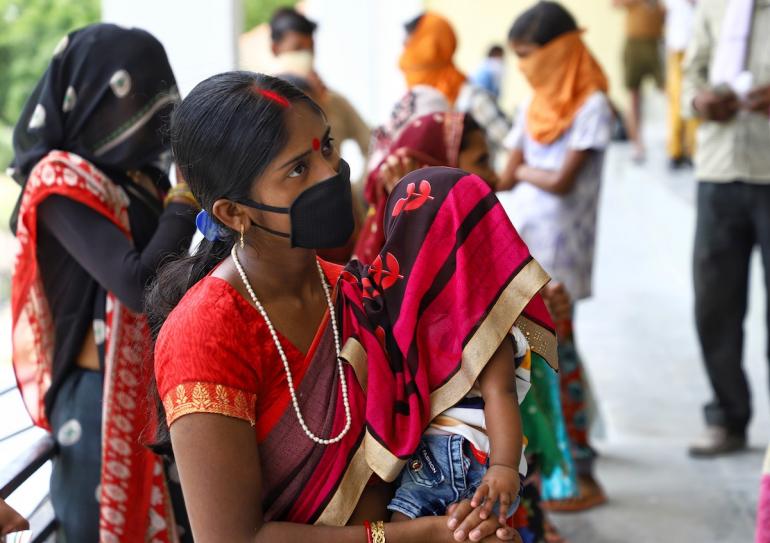Caritas making a difference for pregnant women and new mothers in rural India

Sunitra Devi, a tribal woman from India’s northern state of Jharkhand, has been visiting her local village temple to seek good health for her ailing three-month-old infant.
During her pregnancy, Devi didn’t eat nutritious meals or take supplements, resulting in the birth of an underweight baby boy.
“When I took him in my lap, he was lighter than a falcon feather,” said the 23-year-old mother referring to her son named Chintu. “I thought that with time he would become normal but 15 days after birth, he began developing ailments like fever, diarrhea, and vomiting,” she said.
“Some Ayurvedic herbs provided interim relief but didn’t end my woes. I have prayed at the temple for weeks, but nothing has happened,” she said.
During her pregnancy, Devi avoided seeing a doctor because seeking medical counseling during pregnancy is considered taboo. Financial constraints in her family also didn’t allow her to take a break from her daily wage work at a charcoal store. During all three trimesters Devi worked in the store.
“My husband is a casual laborer and his income kept dwindling due to lack of work. He has an ailing mother and two young sisters to take care of. I thought it being irresponsible if I wouldn’t help him financially as much as I could,” Devi said.
Several months after Chintu’s birth Devi’s younger sister suggested that they should take him to a primary health center for treatment. Upon the routine check-up of both mother and the child, it was found that Devi is suffering from acute Iron deficiency and hadn’t taken enough supplements for the adequate growth of her fetus.
‘They die in miserable conditions’
Alok Kumar, a general physician working in Devi’s village said medical care during pregnancy is alien in far-off Indian hamlets where going to a doctor during pregnancy is considered a bad omen.
Kumar added that pregnant women in these regions take no care of themselves: there is no diet plans, no immunizations for the newborn, or no adequate meals during the post-pregnancy period.
“All this culminates into major problems both for the mother as well as for the newborn baby,” Kumar said. “The results are quite disturbing in the end. A majority of the newborn in Indian villages do not see their first birthdays. They die in miserable conditions,” the doctor said.
UNICEF reported in October of last year that malnutrition caused 69 percent of deaths of children below the age of five in India. The country also has the world’s worst level of child malnutrition.
During a visit to a hospital, Devi met a Caritas team working on the problem of malnutrition among infants and lactating mothers in Indian villages.
The team enrolled her for a special monthly grant provided by India’s federal government for underprivileged mothers with newborn babies.
“Through the grant I’m provided the wage compensation of Rs 5,000 ($80) and I am told that I will be provided this grant for the next five years,” Devi said.
The Caritas team is also assisting her in getting her son fully immunized.
Last year Caritas India introduced the Sabal project in which the Church agency helps pregnant and lactating mothers access basic health benefits from the government and ensure proper safety of the newborn children. As part of this, the Caritas members help government agencies on monitoring children’s health and distributing nutrition supplements to households. They also check up on families with young children returning from migration so they’re able to have quick access to government entitlements.
Personal tragedy
Rashmi Singh, from India’s central state of Madya Pradesh, was another villager unaware that not getting enough food would risk her pregnancy which ended with her having a stillborn baby.
“Nobody in our village takes pregnancy seriously. I didn’t think for a fraction of a second that my carelessness would take away my baby’s life,” Rashmi said.
“When I went to the doctor for the post-pregnancy check-up, I was diagnosed with anemia and severe deficiency of hemoglobin in the blood,” she said.
A few months after her tragedy she attended an awareness program arranged by the Caritas team in her village and she learnt how a lack of proper diet during pregnancy can be lethal for the mother as well as for the unborn child.
“It was then that I decided to become part of the Caritas team and volunteer for its mission of making expecting mothers aware of the dos and don’ts of pregnancy,” Rashmi said. “
Father Paul Moonjely, executive director Caritas India, said the church agency has so far reached more than 120 villages in their efforts to help pregnant women and lactating mothers. There are 470 volunteers helping with the program. - LiCAS.news
Radio Veritas Asia (RVA), a media platform of the Catholic Church, aims to share Christ. RVA started in 1969 as a continental Catholic radio station to serve Asian countries in their respective local language, thus earning the tag “the Voice of Asian Christianity.” Responding to the emerging context, RVA embraced media platforms to connect with the global Asian audience via its 21 language websites and various social media platforms.














